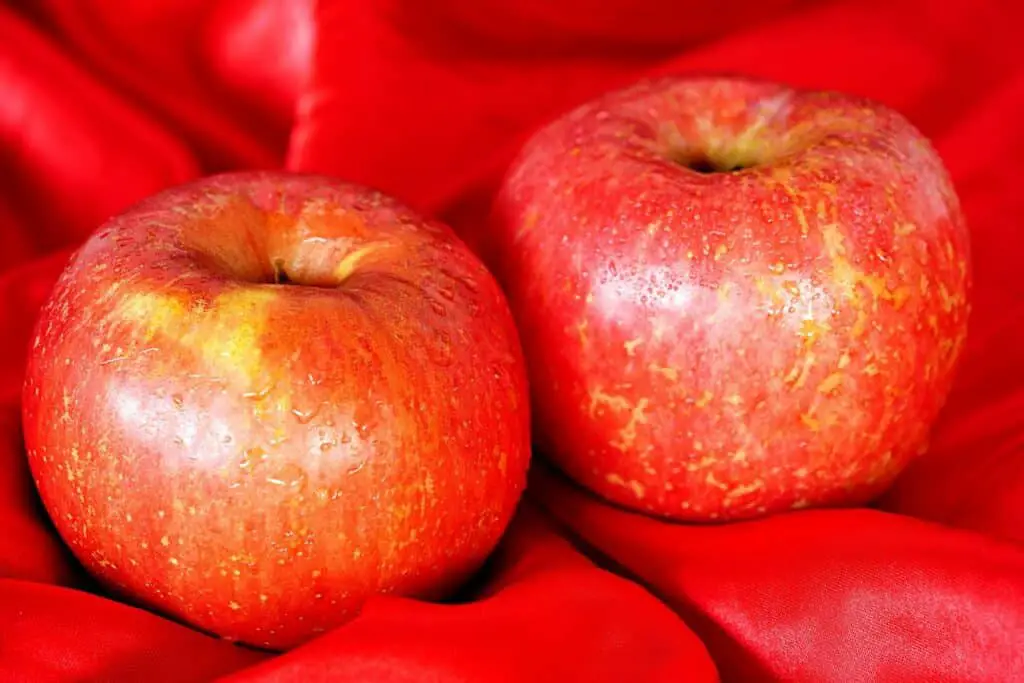Fuji apples are delicious and healthy.
With lifestyle diseases rising every day, there is a need for fruits such as fuji apples.
When enjoying this heavenly crunchiness, your fluffy friends may look at you with some begging eyes.
However, you hesitate to give them because you don’t know if they are healthy for their consumption.
So, can dogs eat fuji apples?
Yes, dogs can eat fuji apples but in moderation.
They’re rich in fiber, vitamin C, calcium, phosphorus, vitamin A and K.
Nevertheless, don’t give too much because they contain sugar which may cause health problems.
This article will look into the health benefits, ways to serve, risks, and whether different dog groups can eat fuji apples.

Can puppies have fuji apples?
Yes, puppies can have fuji apples.
They are rich in nutrients that help in their growth.
However, ensure that you give fuji apples in moderation.
When feeding them for the first time, give a small portion, and observe their reaction.
If no sickly symptoms show, you can include the fuji apples in their diet as a treat.

When fuji apples are bad for dogs
There are instances when fuji apples can be toxic for your fluffy friend.
They include;
Non-organic fuji apples
Most fuji apples found in the stores are non-organic.
They contain pesticides and fungicides that can cause diverse health problems.
If you must feed your dog with non-organic fuji apples, ensure that you wash them thoroughly to eliminate harmful chemicals.
Otherwise, organic fuji apples are the best options.
Seeds and the core
Don’t feed your dog with the seeds or core of an apple; these contain cyanogenic glycosides that can cause vomiting, lethargy, and even death in large quantities.
A small quantity of seeds and core may not do any harm but consuming many of them can be fatal.
Nutritional value of fuji apples to dogs
Low calories
Fuji apples are low in calories, making them perfect as a snack or training reward.
Your dog will not add weight from eating these apples but will get all the nutrients and vitamins to stay healthy and happy.
Vitamin C
Vitamin C helps prevent free radicals from damaging cells.
It also boosts the immune system by helping it fight off infections and viruses like colds or flu.
Fiber
Fiber helps regulate blood sugar levels by slowing down how quickly food moves through your dog’s digestive tract, making him feel fuller longer so he won’t overeat.
Antioxidants
Fuji apples are an excellent source of antioxidants, including vitamin C, quercetin, and phenolic acids.
These compounds work to neutralize free radicals in the body before they can cause damage.
Calcium
Calcium is essential for building strong bones and teeth in dogs.
It also helps maintain muscle tone, blood pressure, and nerve function.
Vitamin K
Vitamin K helps blood clot normally and prevents excessive bleeding when injured or cut during surgery.
It also plays a vital role in bone health regulating calcium levels in dogs.
Phosphorous
Fuji apples contain phosphorus, a mineral that supports bone and tissue development in dogs.
It also plays an essential role in the structure of DNA and RNA, which are essential for normal cell function.
Ways to serve fuji apples to dogs
Applesauce: Fuji applesauce is one of the easiest ways to give your dog this delicious fruit without having chunks of apple floating around in the bowl (which could pose a choking hazard). It’s also easy to make. Peel and chop up some Fujis, then cook them until they become soft enough to puree with a hand blender or food processor.
Apple Chips: Apple chips are the perfect way to enjoy this delicious fruit without worrying about too much sugar or acid. Cut the apple into thin slices and cook them on a baking sheet at 200 degrees Fahrenheit until they turn brown and crispy. Don’t forget to remove the seeds first.
Apple Smoothie: Fuji apples make an excellent addition to homemade smoothies because they’re sweet and have a crisp texture that pairs well with other fruits like bananas, strawberries, or blueberries. You can also add some yogurt for added protein and calcium if needed.
Apple Juice: your dogs will thank you for this amazing drink. It’s sweet and healthy. When giving your dog apple juice, make sure it’s not concentrated or pasteurized because these processes remove most of the nutrients from the fruit.
Chopped Apples: Chopped apples have less juice than whole apples, so they’re easier for your dog to digest without getting an upset stomach. You can chop up the Fuji apples yourself by slicing them into small pieces.
Other healthy fruit options besides fuji apples
Banana: Bananas are a great fruit to give your dog because they contain high potassium levels. It is an electrolyte that helps regulate blood pressure, heart rate, and sodium levels.
Pears: Pears are another great source of potassium and fiber. They’re also rich in vitamin C and antioxidants like quercetin and polyphenols, which help to reduce inflammation in the body.
Blueberries: Blueberries are full of antioxidants and phytonutrients that can protect against diseases such as cancer and heart disease. They also contain vitamin C, which boost the immune system, reduce inflammation and prevent infections.
Strawberries: Strawberries contain vitamin C, fiber, folate, potassium, and antioxidants that help prevent cancer cells from growing in your dog’s body.
Mango: Mangos contain vitamin A and antioxidants, which help fight off free radicals in the body that cause cell damage.
Can diabetic dogs eat fuji apples?
Yes, fuji apples are safe for diabetic dogs.
Despite their high sugar content, diabetic dogs can safely eat fuji apples because they contain fiber.
One of the functions of fiber is to control insulin levels; hence there is no spiking of sugar levels.
Conclusion
There is your answer to whether dogs can eat fuji apples.
Next time you enjoy this crunchy goodness, don’t feel guilty about giving them to your canine companion.
Ensure you remove the seeds and the core because they contain cyanide which is toxic to dogs.
- Why Does My Dog Lick My Other Dogs Face? - September 6, 2022
- Why Does My Rottweiler Lick My Feet ? - September 6, 2022
- Why Doesn’t My Dog Make Any Noise ? - September 5, 2022








